Description
ABSTRACT
Challenges of Section 20 of the Admiralty Jurisdiction Act to International Arbitration Agreements
Abdulrazaq Daibu* and Lukman Abddulrauf**
Arbitration Agreements are agreements parties enter into for disputes arising in the course of their business to be resolved amicably by a neutral third party in a judicial manner. Such agreements are binding and enforceable. Courts have over the course of time, stayed proceedings for parties to resort to arbitration as stipulated in their agreements. Challenges have arisen with the interpretation, in some judicial decisions, of the provision of section 20 of the Admiralty Jurisdiction Act which renders null and void any maritime contract that contain provisions for parties to resort to arbitration in cases of disputes arising from their admiralty contract. Such contractual clauses were interpreted as ‘ouster’ clauses. This effectively restricts parties ‘freedom of contract’ rights. This article investigates these challenges and finds that such clauses should not be interpreted as ousting the jurisdiction of the court but rather allow parties to stipulate a procedure under which they may settle their differences.
INTRODUCTION
Arbitration is an alternative method of dispute resolution in which a neutral third party (arbitrator) hands down a decision after a hearing, of which both parties have an opportunity to be heard.1 It is a fair resolution of disputes or differences between not less than two parties for determination in a judicial manner by person(s) other than a court.2 The basis for arbitration as an alternative dispute resolution mechanism is hinged on the desire of the parties to have a less cumbersome, less expensive and informal way of settling their dispute without the technicality and rigidity associated with litigation in a shorter time.3
Based on the principles of pacta sunt servanda,4 parties are generally free to enter into a contract and such a contract is enforceable by law provided such agreement is lawful and not contrary to public policy.5 Thus, it is usual for parties in the course of their commercial transactions to insert arbitral clauses in the agreement in case of any dispute arising therefrom. This means that parties could agree that disputes in the course of their contract be submitted to an arbitrator whether national or foreign.
* LL.M, BL. Lecturer, Department of Private and Property Law, Faculty of Law, University of Ilorin and Legal Practitioner, R. A. Lawal-Rabana & Co
** LL.M, BL. Lecturer, Department of Public Law, Faculty of Law, University of Ilorin
- A.A. Daibu, ‘The Lagos State Arbitration Law and the Doctrine of Covering the Field: A Review’ (2015) 6(1) The Gravitas Review of Business and Property Law 44; A.A. Daibu, ‘Application of the Rules of Natural Justice in Arbitral Proceedings in Nigeria’ (2013) 1 Ife Juris Review 56; M.M. Akanbi, Domestic Commercial Arbitration in Nigeria: Problems and Challenges (Lambert Academic Publishing Germany, 2012) 47; T.A. Adewuyi, ‘The Effect of Section 20 of the Admiralty Jurisdiction Act No 59 of 1991 on International Arbitration Clauses’ (2006) 1 University of Ilorin law Journal 1; R. Bernstein et al., Handbook of Arbitration Practice (3rd edition, Sweet & Maxwell, London 1998) 13; Black’s Law Dictionary 6th ed. (Centennial Edition) (US: West Group Publishing Co., 1990) 105
- J.O. Olorunfemi, ‘The Effect of Arbitration Agreement on the Jurisdiction of the Court in Nigeria'(2009) 2(1) Nigeria Journal of Public Law 310; Halsbury’s Laws of England (Vol. 2, 3rd edn, London: Butterworths 1964) 256 para 501; F. Ajogwu, Commercial Arbitration in Nigeria: Law and Practice (Lagos: Mbeyi & Associates Nig. Ltd 2009) 5
- J.O. Orojo and M.A. Ajomo, Law and Practice of Arbitration and Conciliation in Nigeria (Lagos: Mbeyi & Associates Nig. Ltd 1999) 42–46; Ajogwu, (n 2) 5. See also the case of Ebokan v Ekwenibe & Sons Trading Co. (2001) 2 NWLR (Pt 696) 32 at 43
- Freedom of contract: It means that agreements of a party to a contract which are not fraudulent are to be observed. See AG Nasarawa State v A G Plateau State (2012) 10 NWLR (Pt 1309) 419 at 450
- See Northern Assurance Co. Ltd v Wuraola (1969) NSCC 22; United Bank of Nig. Ltd v Ozigi (1991) 2 NWLR (Pt 176) 677; Nika
Fishing Co. Ltd v Lavina Cooperation (2008) 16 NWLR (Pt 1114) 509 at 542 E; Dragetanos Const. (Nig) Ltd v Fab Madis Ventures Ltd (2011) 16 NWLR (Pt 1273) 308 at 353 D-F; AG Nasarawa State v A G Plateau State (n 4)

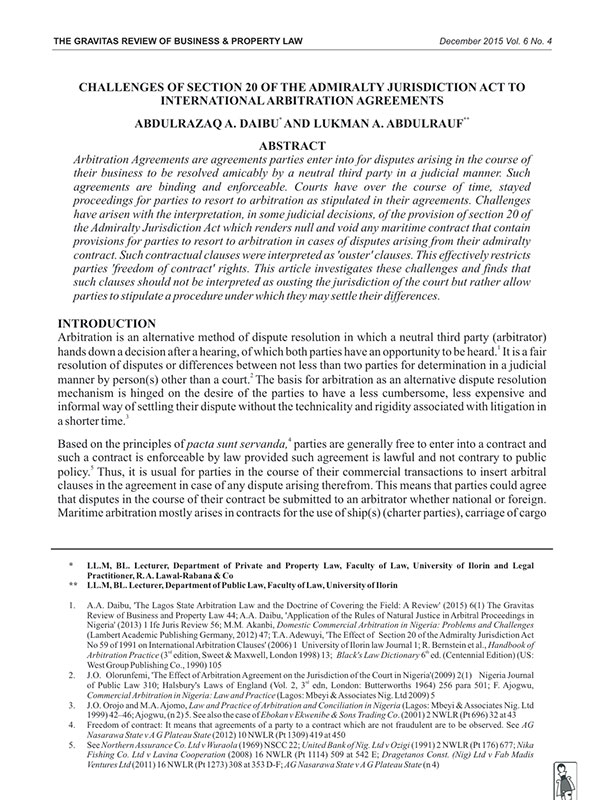
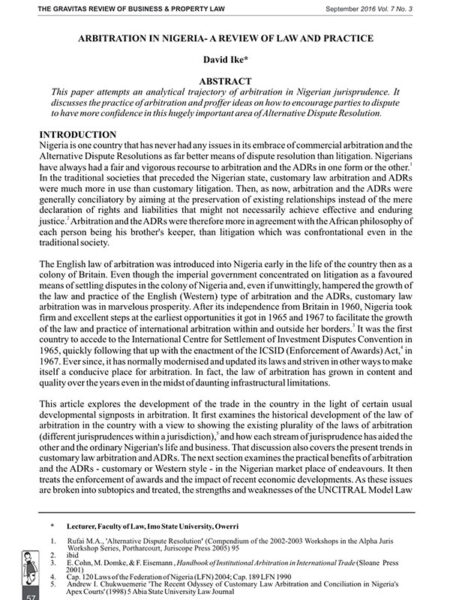
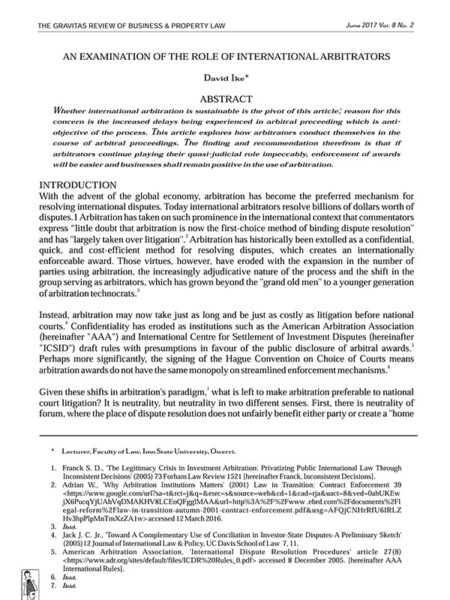
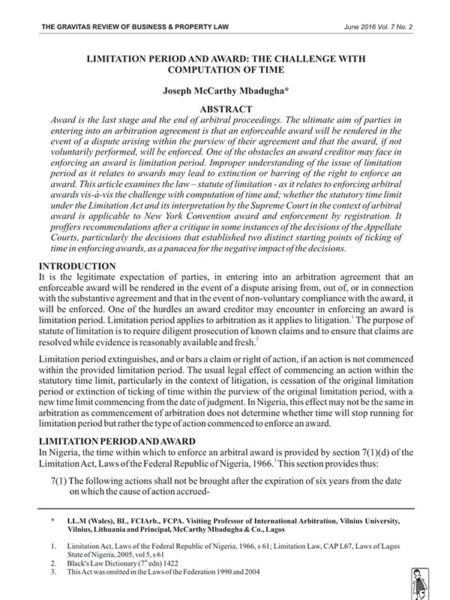
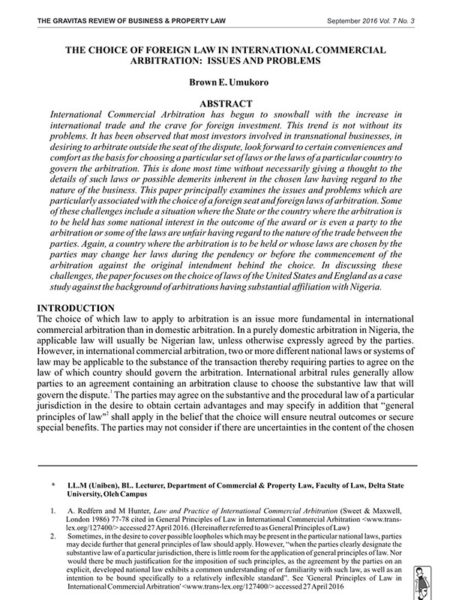


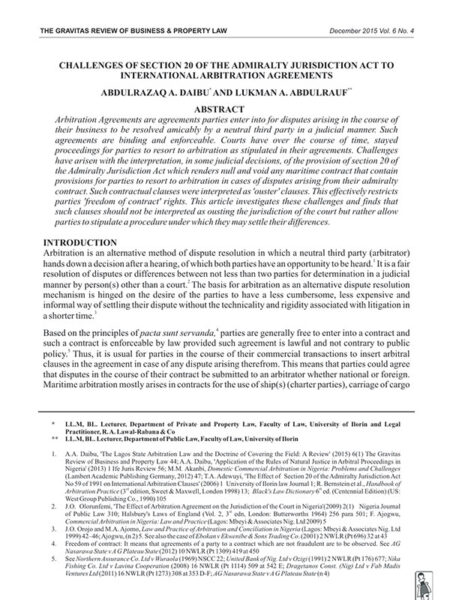
Reviews
There are no reviews yet.